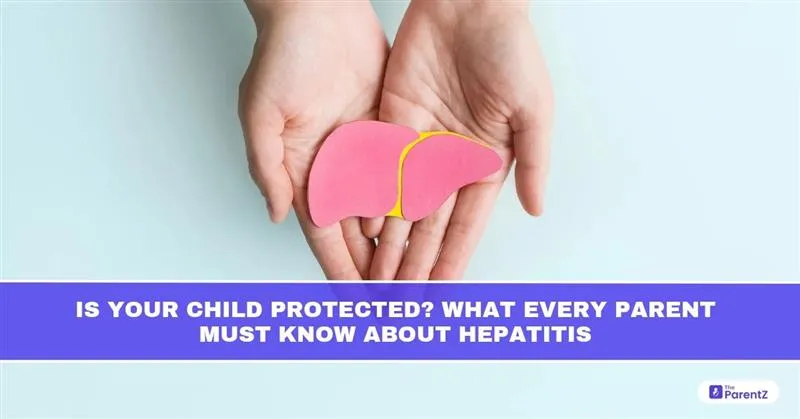As a parent, you baby-proof the house, vaccinate against common infections, and teach good hygiene but what about hepatitis?
What is Hepatitis?
Hepatitis is an inflammation of the liver, often caused by viruses. In children, it can range from mild, short-term illness to chronic infections that silently damage the liver over the years.
The main hepatitis viruses that affect children are:
- Hepatitis A – Spread through contaminated food or water
- Hepatitis B – Spread through blood, birth, or body fluids
- Hepatitis C – Spread through infected blood, less common in children
- Hepatitis E – Food and waterborne, usually seen in older children or during outbreaks
In some cases, hepatitis may also be caused by autoimmune diseases, medications, or metabolic disorders, but viral hepatitis remains the most preventable and common cause in children.
Why Should Parents Worry?
Because many types of hepatitis can be silent in children.
A child may seem completely healthy while hepatitis viruses slowly damage the liver, increasing the risk of:
- Liver scarring (cirrhosis)
- Liver failure
- Liver cancer (especially with hepatitis B)
- Fatigue, poor appetite, growth issues, and learning difficulties
The most heartbreaking part? Much of this is preventable with timely awareness and vaccination.
Hepatitis A: The Dirty Hand Disease
- Transmission: Fecal-oral route (contaminated hands, food, or water)
- Common Age Group: 1–10 years
- Symptoms: Fever, vomiting, yellowing of eyes (jaundice), abdominal pain
Most cases are mild and self-limiting, but outbreaks are common in schools and playgroups with poor hygiene.
Prevention:
- Handwashing
- Clean drinking water
- Hepatitis A vaccine (recommended after 1 year of age)
Hepatitis B: A Silent but Dangerous Infection
- Transmission: From mother at birth, blood, unsterile needles, cuts, or infected body fluids
- Common Mode in Children: Perinatal (from mother to baby) or early childhood exposure
- Symptoms: Often none until liver damage becomes severe
If not caught early, hepatitis B can become chronic in children, silently damaging the liver over decades.
Prevention:
- Birth dose of hepatitis B vaccine within 24 hours of birth
- Full 3-dose schedule as per the National Immunization Programme
- Avoid sharing razors, nail cutters, or toothbrushes
- Ensure safe blood transfusions and sterile medical procedures
Did You Know?
Children infected at birth have a 90% risk of developing chronic hepatitis B. But timely vaccination can reduce this risk to less than 10%.
What About Hepatitis C?
Though rare in children, hepatitis C can be transmitted:
- From mother to child (if mother is infected)
- Through unsafe medical injections or transfusions
Unlike hepatitis B, there’s no vaccine for hepatitis C, but newer treatments offer high cure rates in children.
Symptoms Parents Should Watch For
In most cases, hepatitis in children is asymptomatic, but when symptoms do appear, they may include:
- Yellowing of eyes or skin (jaundice)
- Fever
- Fatigue or lethargy
- Poor appetite
- Nausea and vomiting
- Pale stools or dark urine
- Abdominal swelling (in late stages)
Always consult your pediatrician if any of these signs persist, especially after exposure to infected water or during outbreaks.
Vaccination: Your Child’s Best Shield
In India, the Universal Immunization Programme (UIP) provides free hepatitis B vaccination at birth, 6 weeks, 10 weeks, and 14 weeks.
Hepatitis A vaccine is optional but recommended by pediatric associations and is available at private clinics.
Recommended Schedule:
- Hepatitis B: Birth dose (within 24 hours) + 3 primary doses
- Hepatitis A: 2 doses after 1 year of age (6 months apart)
Speak to your pediatrician about missed doses or catch-up schedules—it’s never too late to protect your child.
Everyday Prevention for Families
- Wash hands before meals and after using the toilet
- Boil drinking water if unsure about safety
- Avoid roadside or undercooked food
- Ensure your child’s vaccinations are complete
- Ask your doctor about your own hepatitis B status during pregnancy
- Teach children to avoid sharing combs, toothbrushes, or personal hygiene items
When to Test?
Your doctor may recommend hepatitis testing if:
- Your child has unexplained jaundice or fatigue
- You’re a known hepatitis B carrier or had an incomplete birth vaccination
- Your child has had a blood transfusion or surgery
- You live in or travel to areas with poor sanitation
Simple blood tests can help detect hepatitis A, B, or C.
Conclusion
Hepatitis is often a hidden threat in childhood, but it’s also one of the most preventable. On this World Hepatitis Day, take a moment to review your child’s vaccination card, talk to your doctor, and make sure your family’s liver health is protected.
Because when it comes to hepatitis, awareness is the first dose of prevention.
References
- Indian Academy of Pediatrics (IAP) Immunization Guidelines
- WHO Fact Sheet on Viral Hepatitis
- CDC – Hepatitis in Children
- Ministry of Health & Family Welfare, India – Universal Immunization Programme
- Journal of Pediatric Gastroenterology and Nutrition – Viral Hepatitis in the Pediatric Population





Be the first one to comment on this story.